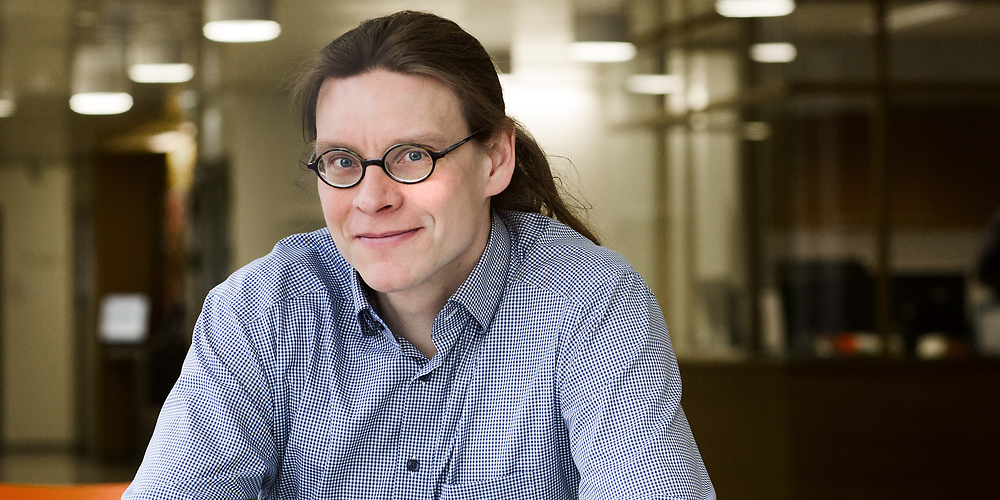October 25, 2022 | News | Synergy Grant
Largest ERC Grant Goes to the BIOSFER-Team Led by MPIDR Director Mikko Myrskylä

© Linda Tammisto
The European Research Council (ERC) rewarded a 14 Million Euro Synergy Grant for a period of six years to BIOSFER. The project brings together Mikko Myrskylä, Director of the Max Planck Institute for Demographic Research (MPIDR), Siri Eldevik Haberg from Norway and Cecilia Ramlau-Hansen from Denmark with the shared scientific vision of untangling the biologic and social causes of low fertility in modern societies.
High-income countries are experiencing unprecedentedly low and increasingly polarized fertility. Differences between social groups are growing, with a particular increase in childlessness among low-educated men and women.
The BIOSFER project investigates how social, biological and psychological forces produce the emerging fertility patterns in young adults, and to what extent the fertility decline and polarization can be attributed to social and biomedical factors.
Key barriers to answering this question are inadequate data and theoretical frameworks. “We leverage ideas from several disciplines and propose that the existing theories must be complemented with concepts of risk aversion, intergenerational transmission of fecundity, epigenetics and beyond, in order to understand modern fertility,” says Mikko Myrskylä, MPIDR Director and the corresponding principal investigator of the BIOSFER project.
Together with the principal investigators Siri Eldevik Haberg, a physician and Director of the Center for Fertility and Health at the Norwegian Institute of Public Health and Cecilia Ramlau-Hansen, Professor of Epidemiology at Aarhus University in Denmark, they will analyze the two richest population-based longitudinal pregnancy and pubertal cohort surveys in the world: The Norwegian Mother, Father and Child Cohort Study (MoBa) and the Danish National Birth Cohort (DNBC).
These surveys include more than 200,000 young adults followed from fetal life onwards. Analyzing these data will allow the scientists to understand how the biological ability to become parents – fecundity – and social processes such as economic uncertainty and partnership dynamics together influence fertility. “We develop a uniquely integrative life-course perspective that is neither social or biomedical, but combines central ideas from both,” says Mikko Myrskylä.
In her letter to the principal investigators, Maria Leptin, President of the ERC writes: “I am confident that this grant will help you to develop your research at the highest possible level and to achieve ground–breaking results in the spirit of the ERC.”
About Mikko Myrskylä
He is Director of the Max Planck Institute for Demographic Research (MPIDR) and Professor of Social Data Science at the University of Helsinki. Prior to taking his current position at the MPIDR, he worked at the London School of Economics and Political Science, where he was appointed as Full Professor of Demography at the age of 35. His training includes a PhD in Demography from the University of Pennsylvania and a PhD in Statistics from the University of Helsinki. Most of his work is on fertility dynamics, statistical forecasting, and population health.
About the European Research Council and the Synergy Grant
In 2007, the European Research Council (ERC) was founded by the European Union as the first European institution for research funding. Every year, the world's best and most creative researchers of all ages receive funding after intensive applications to carry out their projects in Europe. There are different grants, which differ in amount and duration of funding. Synergy Grants are the highest awards of the ERC. They are awarded to research teams consisting of two to four researchers. The aim is to implement ambitious research projects across institute and country boundaries over a period of six years.
Facts and Figures
In total 359 research teams applied, of which 29 teams from 19 countries across Europe and beyond received a research award. Germany is involved in 14 projects with 23 principal investigators (France showing similiar numbers: 15 projects with 22 principal investigators.) Two of the 2022 Synergy Grants go to Max Planck Institutes of the Max Planck Society.